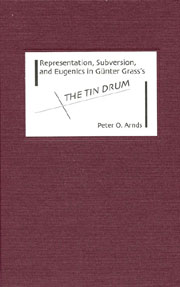Book contents
- Frontmatter
- Contents
- Acknowledgments
- Abbreviations
- Introduction
- 1 Representing Euthanasia; Reclaiming Popular Culture
- 2 Heteroglossia from Grimmelshausen to the Grimm Brothers
- 3 The Dwarf and Nazi Body Politics
- 4 Oskar's Dysfunctional Family and Gender Politics
- 5 Oskar as Fool, Harlequin, and Trickster, and the Politics of Sanity
- 6 Gypsies, the Picaresque Novel, and the Politics of Social Integration
- Epilogue: Beyond Die Blechtrommel: Germans as Victims in Im Krebsgang
- Works Cited
- Index
6 - Gypsies, the Picaresque Novel, and the Politics of Social Integration
Published online by Cambridge University Press: 05 February 2013
- Frontmatter
- Contents
- Acknowledgments
- Abbreviations
- Introduction
- 1 Representing Euthanasia; Reclaiming Popular Culture
- 2 Heteroglossia from Grimmelshausen to the Grimm Brothers
- 3 The Dwarf and Nazi Body Politics
- 4 Oskar's Dysfunctional Family and Gender Politics
- 5 Oskar as Fool, Harlequin, and Trickster, and the Politics of Sanity
- 6 Gypsies, the Picaresque Novel, and the Politics of Social Integration
- Epilogue: Beyond Die Blechtrommel: Germans as Victims in Im Krebsgang
- Works Cited
- Index
Summary
Abel was a keeper of the sheep, Cain a tiller of the ground. That is, the first was a nomad and the second was sedentary. The quarrel of Cain and Abel has gone on from generation to generation, from the beginning of time down to our own day, as the atavistic opposition between nomads and the sedentary, or more exactly as the persistent persecution of the first by the second. And this hatred is far from extinct. It survives in the infamous and degrading regulations imposed on the Gypsies, treated as if they were criminals, and flaunts itself on the outskirts of villages with the sign telling them to “move on.”
Persecuted Transients
Michel Tournier's Le Roi des Aulnes (1970; translated as The Ogre, 1972) displays the international appeal that fascism's exclusion of the poor, transients, and the Gypsies had and still has for the bourgeois mind. In France the persecution of Gypsies, the attempt to make them settle down and give up their nomadic way of life, and the desire to educate them and turn them into useful citizens arose in the Age of Absolutism, under Louis XIV. This policy was an improvement vis à vis what Foucault describes in connection with the poor and transients in the age of the great confinement, the Early modern Age, with its “imperative of labor” resulting in arrests of beggars roaming the streets of Paris (1532), who were then forced to work in the “sewers of the city, chained in pairs” (MC, 47).
- Type
- Chapter
- Information
- Publisher: Boydell & BrewerPrint publication year: 2004



